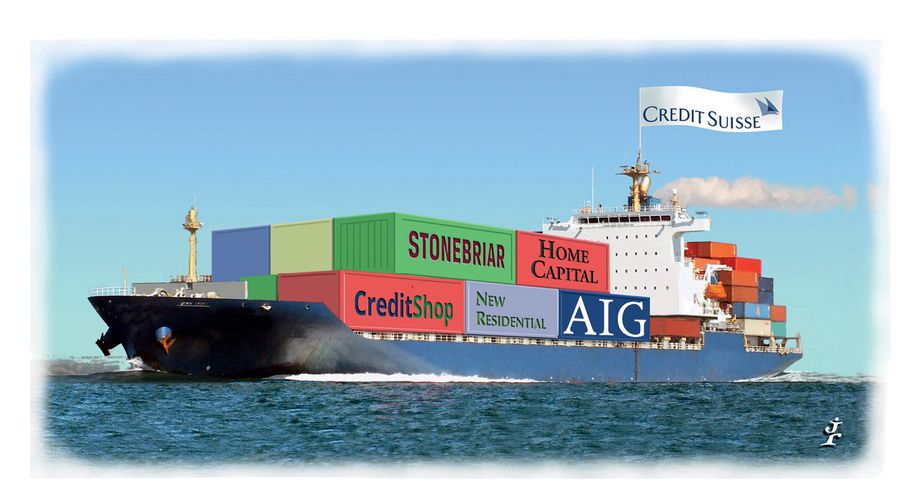Raising the bar
US structured finance was buoyant in 2017, defying doom-sayers who said regulation would kill off issuance. ABS supply soared above US$230bn, the most in a decade, CMBS volumes were higher than expected at over US$70bn and newcomers emerged in the residential mortgage-backed securites sector. Innovating in all areas was Credit Suisse, IFR’s North America Structured Finance House of the Year.
A bank deserves plaudits when it maintains leadership in a strong market by stepping back from some on-the-run sectors it helped create, and turning its focus instead to new and more challenging ideas for clients.
So kudos to Credit Suisse, which held onto the top spot in Thomson Reuters’ league tables for the IFR awards period for ABS and RMBS with an almost 11% market share, and with some big accomplishments during that time.
“Not only are we doing strategic transactions, not only are we doing new deals for folks, but we are number one as well,” said Michael Dryden, global head of securitised products finance at Credit Suisse.
“It is interesting because a lot of the time, people who are number one are doing cookie-cutter repeat deals. We’ve actually been consistently number one by not doing that.”
Taking debut issues alone – among the most difficult to pull together – Credit Suisse was streets ahead of its peers.
As some of its competitors stumbled on introducing newcomers – bringing deals that were either badly timed, inappropriately structured or simply too big – Credit Suisse introduced 10 debut transactions in 2017.
Those debutants spanned many asset classes, including aviation, solar, sub-prime credit cards and jumbo mortgages – exemplifying Credit Suisse’s broad expertise.
While competitors were churning out multi-billion credit card and auto ABS to improve their league table standings, Credit Suisse was looking at new areas that made more economic sense.
In the credit risk transfer market – a US$50bn asset class that Credit Suisse helped develop in 2013 for Freddie Mac and Fannie Mae – the bank stepped back from what have become fairly standard deals for the housing giants.
It opted instead to create a new type of CRT deal for Freddie that was backed by reperforming loans – the first of its kind.
Credit Suisse also created an asset class that others are likely to emulate in months ahead by securitising Ginnie Mae mortgage servicing rights for PennyMac, the largest Ginnie Mae servicer.
It did that deal, the first in what has potential to be a huge asset class, on a sole basis.
Among newcomers it introduced was insurance giant American International Group in the RMBS sector.
US housing agencies still dominate the US$10.3trn mortgage market, with private label securitisation still a shadow of its pre-financial crisis size. But with the housing market firing on all cylinders, investors have been keen to get exposure to it, and Credit Suisse knew that a new name selling bonds would provide perfect fodder.
It structured not one, but two, prime mortgage deals for AIG in 2017.
Tougher stories
It guided clients through regulatory changes, structuring Colony Northstar’s CMBS in June. The deal was the first single-borrower security to use a horizontal risk-retention structure where the entire capital stack was contributed to the trust with unrated bonds above the 5% risk-retention class, and was copied by several other borrowers.
It took tougher stories on too.
After months of negative headlines in the unsecured consumer loan sector, and a soured relationship with another bank, Prosper Marketplace looked to Credit Suisse to help structure its first rated deal from its own shelf following a market hiatus.
Credit Suisse broke open the container ABS market, bringing three deals in quick succession in early 2017 – two for Seaco in private and public markets as a joint structuring agent, and another for Triton which it solely led – after a 14-month hiatus following a number of bankruptcies in the industry.
And in other areas – not reflected in league tables, but that show commitment to clients – it used balance sheet for rescue financings.
When Canadian Home Capital faced a crisis after a run on its deposits, Credit Suisse was the first in a syndicate of five syndication parties to commit C$500m (US$393m) to a C$2bn secured lending rescue facility that was eventually refinanced by Warren Buffett’s Berkshire Hathaway.
Time was of the essence, and all the work was done over a weekend.
“Even in a market as good as it’s been, there were problems,” said Dryden.
“They would not have been able to open their doors on Monday unless they got secured lending.”
To see the digital version of this review, please click here.
To purchase printed copies or a PDF of this review, please email gloria.balbastro@tr.com.



